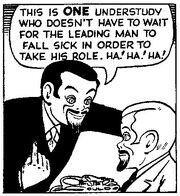Yollman (first name unrevealed) was a successful actor. He was playing the lead in a production of the play Blue Flame at the Auditorium Theater. His wife Dianne was the leading lady. Dianne's former fiancée Clarke Van Dyke was Yollman's understudy. The two men looked very similar (with light eyes and short dark beards), excepting that Yollman had blond hair while Van Dyke had dark hair.
Kidnapped by Van Dyke[]
Shortly after Dick Tracy's adventure with B-B Eyes, Van Dyke approached him and reported that Yollman had gone missing. In fact, Yollman was being held captive by Van Dyke with the help of the diminutive hypnotist Matri. Matri kept Yollman in a state of hibernation while Van Dyke took over Yollman's role and tried to re-kindle his romance with Dianne. Van Dyke was enjoying some success in these endeavors when Matri was unexpectedly killed in a traffic accident.

Yollman (right), with Clarke Van Dyke.
Without Matri to re-new the hypnotic trance, Yollman slowly emerged. He heard Dianne and Van Dyke plotting to dispose of him. Angered, he found Van Dyke's gun and forced his understudy to accompany him to the theater. There, Yollman held the gun on Van Dyke and made him re-enact the play while Yollman mocked his performance from the audience.
This went on for several hours until Van Dyke tripped over a rope that held a sandbag in the rafters. The sandbag struck Van Dyke and he fell on a prop knife. At this point, Dick Tracy (who had been investigating Yollman's disappearance) arrived on the scene. Believing that he was (indirectly) responsible for Van Dyke's injury, Yollman fled.
Escape to Wood City[]
Yollman hopped a passing freight train and made his way to a small town. Jumping from the train, he was injured and found by some local teenagers. They took him into town, where he sought out a barber shop to get cleaned up and have his beard shaved. Yollman believed at this point that he was likely wanted for murder (not knowing that Van Dyke that survived and recovered), and he decided to lay low in this small town.
The teenagers who had found him were part of their high school acting troupe, and they recruited Yollman to be their new coach. One of the teenagers, Willie Amard, introduced Yollman to his father, using the alias “Mr. Jones” that Yollman had adopted. Yollman rented a recording machine from a local music shop and recorded his own voice saying each of the kids’ parts so they could learn the proper diction. Mr. Amard, who was also the drama critic for the local newspaper, recognized Yollmans’ voice and the two men met that night as Yollman was searching for his lost identification by the train tracks where he had fallen.
Amard urged Yollman to give himself up, but Yollman refused. The two men struggled, and Yollman once again jumped onto a passing train. Despairing, he leapt from train as it passed over a river, intending to kill himself. Amard witnessed the jump and called for help. Yollman was pulled from the river and called for Dick Tracy so he could turn himself in.
Tracy arrived at the hospital where Yollman was being treated, along with Van Dyke and Dianne. Yollman had suffered a concussion and in his delirium was reciting his lines to Dianne, professing his love. Dianne overheard and returned to her husband's arms. The couple reconciled and Van Dyke stepped aside.
NOTES[]
- Wood City is apparently an analog for Woodstock, a rural community north of Chicago. Gould and his family had lived in Woodstock for several years by the time this story appeared in the strip. In later stories set there (e.g. Mrs. Volts), Gould would refer to the actual location Woodstock.
- The character of Yollman was apparently inspired by modeled on the actor Orson Welles, who had made a name for himself on stage, in radio drama, and later in films. Welles had attended the Todd School for Boys in Woodstock for five years,and first became interested in theatre through school productions. Later, he made his professional debut as an actor and director at the Woodstock Opera House, which is now dedicated to his memory. Years later, Welles would say that he regarded Woodstock, Illinois, as the closest thing he had to a "home town."